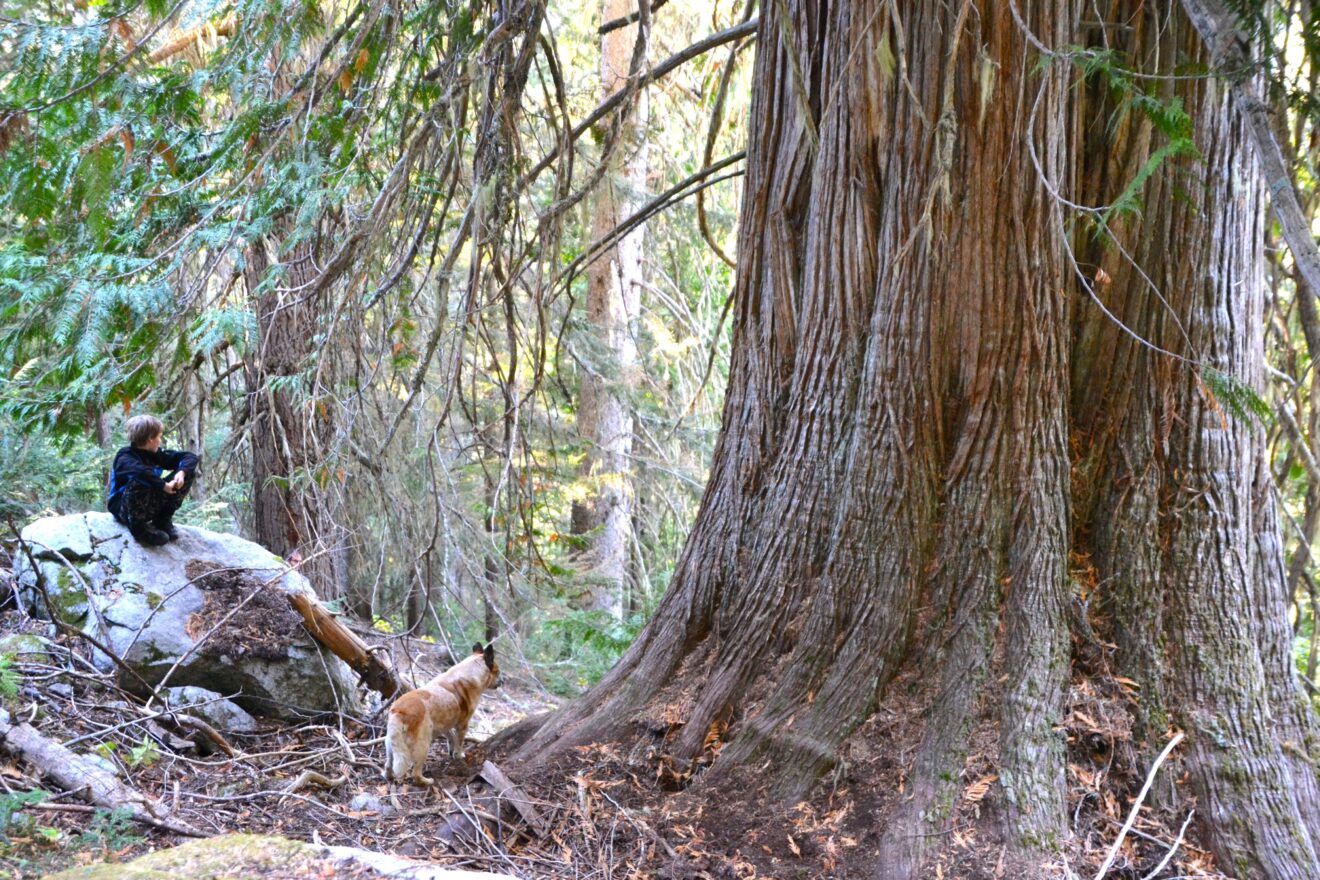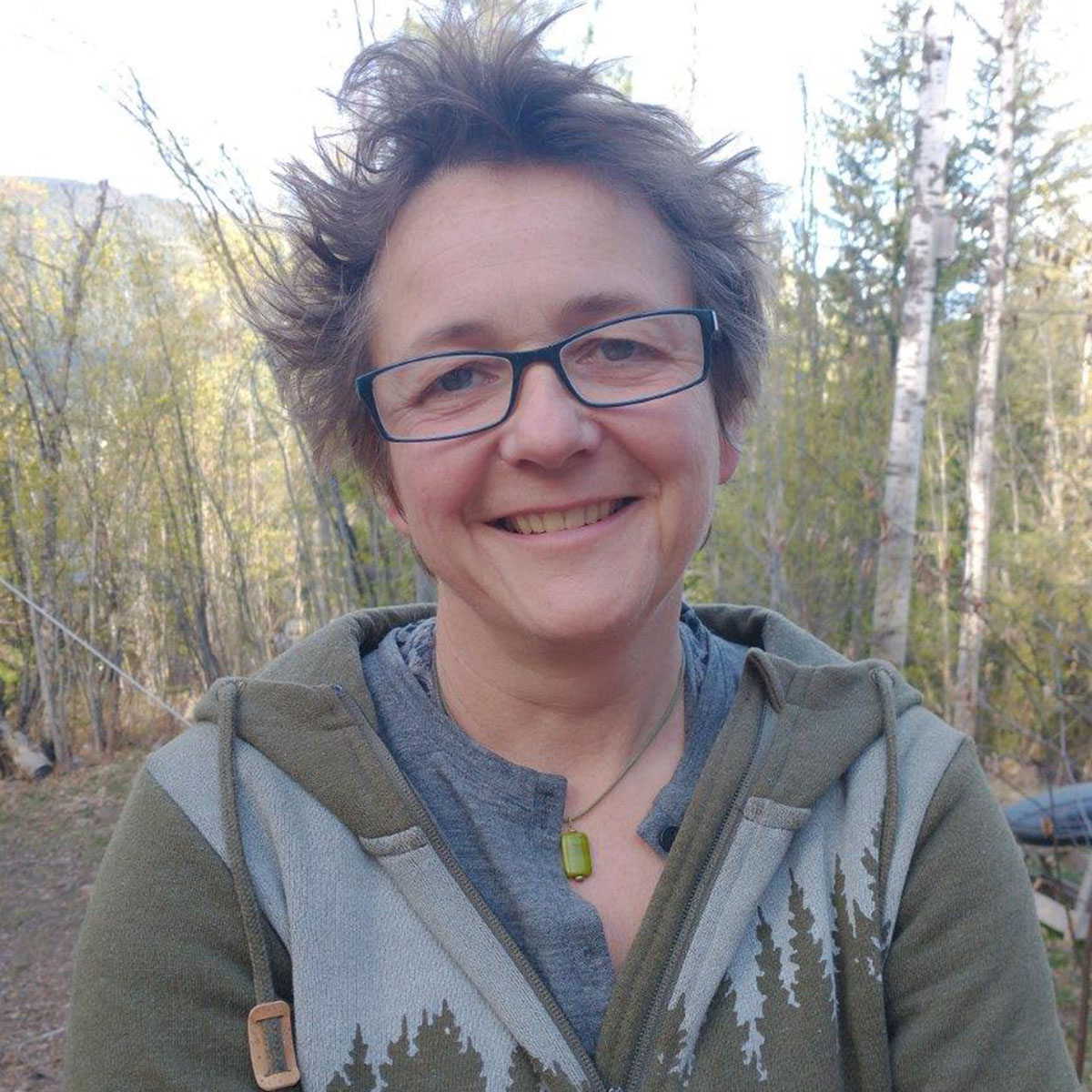New Paradigms for Old Growth — Faces & Places: Rachel Holt
Story by Megan Jamison, Kootenay Conservation Program
Working to shift the underlying paradigms of society takes commitment and tenacity, as well as the ability to see the big picture of what needs to change and the vision of how to get there.
Ecologist Dr. Rachel Holt is someone who embodies these qualities and is unwavering in her dedication to what she sees as the vitally important work of conservation.
“I wish this work wasn’t necessary, but it is totally critical, and knowing that is what keeps me going each day. The key thing that all my work has revolved around for a long time is changing how we manage the land in BC: changing how we manage our forests, how we think about the value and importance of our forests.”
Dr. Holt has been doing this work for over 30 years, mostly for the provincial government and for various First Nations.
Her list of contributions, projects, and involvement on local and provincial Boards is extensive.
Recently, Dr. Holt worked as a member of the Ministerial Technical Advisory Panel (TAP) on Old Growth, which was tasked with identifying old growth deferral areas for the province as recommended by the provincial Old Growth Strategic Review (2020).
This review recommends that the provincial government must switch to managing forests in a way that prioritizes ecosystem health first and foremost, including protecting significant parts of BC’s remaining old growth forests.
While talking about this paradigm shift,
Dr. Holt maintains her enduring positivity while noting that the recommendations from the Old Growth Strategic Review “… have been implemented in somewhat of a slow and mediocre fashion to date.
“As members of the TAP, we are tasked with critiquing how the provincial government is implementing the work that we did. All along we’ve been very concerned by various things, like BC Timber Sales (BCTS) still logging the deferral areas when they can. My work is ongoing to try and improve the understanding and intent of how the provincial government implements the things they said they were going to, to make the paradigm shift real and change things on the ground.”
Here in the Selkirk Region, the TAP deferral areas are in place, for now, though it is one of the few areas of the province where this is the case.
“It’s a good thing,” agrees Dr. Holt , “because here in the Kootenays the condition of old forests is poor. Even the basic targets and requirements of the Kootenay Boundary Land Use Plan around old growth have not been implemented by the province in a way that meets the intent of the land use plan.”
Dr. Holt has also worked for many First Nations; she was an expert witness in the precedent-setting Blueberry River First Nations court case, Yahey vs British Columbia, which was filed in 2015, followed by the BC Supreme Court decision in 2021.
The Yahey case was the first in Canada to recognize an infringement of treaty rights resulting from the cumulative effects of various projects approved over many years and the provincial regulatory regime itself, rather than from the effects of a specific project.
This case was historic, as Dr. Holt explains; “As we collectively try to implement DRIPA (the Declaration on the Rights of Indigenous Peoples Act), the Blueberry River case highlights the fact that the provincial management framework has failed for both First Nations rights and in land management. Those two issues really came together, in terms of an impetus for change in how we do management.”
The paradigms of how land is managed in BC, and how provincial governments interact with First Nations governments are both overarching and complex. So, what are some of the solutions Dr. Holt sees as critical?
To enable ecosystem health to be prioritized, and co-governance with First Nations to happen, there is a big need to shake up the economics of forest management.
One key step would be to shift from having only six or seven large companies driving how industrial forestry operates, to many more mid-sized companies such as Kalesnikoff who can operate on a smaller budget of wood supply, but provide a much higher ratio of jobs for every tree harvested through the production of value-added forest products.

An ancient western red cedar in the Russell Creek Old Growth Forest, Slocan Valley. — Submitted photo
The transition could also include many more community forests such as the Harrop-Procter Community Forest Cooperative.
“In recent history, forestry in BC has not prioritized either ecosystem health, or resilient long-term jobs – and a change in allotted timber volume is needed to allow both things to happen,” she clarifies.
Perhaps most importantly, Dr. Holt emphasizes that “our government absolutely has to provide a strong leadership role to change the culture of people across a range of jobs. This includes providing clear direction to BCTS and other forestry companies to act in accordance with the government’s stated intention to do this good work. What is considered acceptable needs to change.”
Dr. Holt has called Nelson home for 25 years, and says it is a fantastic place to bring up kids and enjoy the outdoors. Her sense of humour helps her stay balanced and optimistic while doing this work, as well as her ability to notice the positive things that are happening Her advice for others is to keep supporting any positive changes that we see, try and hold people accountable when that is not happening, and to continue to use our voices to speak up for what we believe in.
“The contribution of forests in BC to mitigate climate change is massive, yet not even considered in today’s management regime,” Dr. Holt said.
“And, BC is a refuge at the scale of North America in terms of biodiversity – the last corner left with anything like functioning ecosystems, and it’s globally significant! Appreciating what we have here in BC is the first step in change, so go outside and remember to be in awe of the amazing place we live. Then the paradigm shift can really get underway.”
























